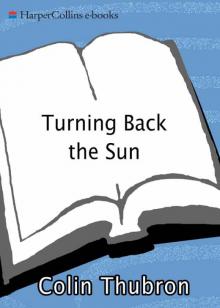Read Turning Back the Sun Storyline:
Far away from the city of his birth, in a frontier town on the edge of tribal wilderness, a doctor tries to resolve the seemingly unreconcilable demands of his public career and his personal feelings. He believes his exile her to be temporary, and youthful memories of the distant city torment him with an unbearable sense of loss. Yet he has grown to love a fellow exile, a woman of fierce independence and strong will, who belongs by nature to the warmth and chaos of the frontier. But, during a summer of drought and disease, the desert erupts into savagery and he is at last confronted by the choice of returning to the city or of remaining with her.From Publishers WeeklyThubron is a British travel writer ( Where Nights Are Longest ) and novelist ( A Cruel Madness ) whose sense of atmosphere and character may remind the reader of Graham Greene, without seeming at all derivative. This novel has a rather portentous allegorical framework: in an unnamed country, presumably somewhere in Africa, hero Rayner (no first name) is a doctor struggling with a mysterious disease in a provincial town set in a wilderness inhabited by primitive bush people. He dreams nostalgically of the langorous, more cultivated coastal capital city where he grew up. After murders of townspeople by the savages, racial hatred begins to fester. Rayner, fascinated by the savages, becomes increasingly involved in their lives of apparent exile from an imagined paradise, and when he has a longed-for opportunity to return to the capital from which he was once exiled, he refuses to take it. Though the framework is heavy, Thubron's writing has remarkable vigor and fluency; and in Rayner's relationships--with the dancer Zoe, and with Ivar, a childhood friend who is now a rather sinister army officer--he shows sharp psychological insight and creates considerable pathos. In the end the book becomes a moving lament for a vanished world and for the difficulties of human communication. It's by no means a casual read, but an ultimately rewarding one. Copyright 1992 Reed Business Information, Inc. From Library JournalThe aborigines believe that if they can turn back the sun, prevent it from "dying" each night, then the tree that once connected heaven and earth will flourish anew and "everything will be all right." Rayner is a doctor temporarily assigned to an army unit sent to pacify these "savages," a few of whom have been raiding the outlying farms of this unspecified frontier town at a time of severe drought. As he watches them perform the "djannu" ritual, it seems for an instant that the sun does freeze on the horizon before inexorably resuming its journey. Nominated for the 1991 Booker Prize, this cryptic novel by a well-known British travel writer/novelist is a rumination on both our vulnerability to the vicissitudes of life and the resilience of the human spirit. In the face of the violence (not necessarily aboriginal) brought on by feelings of helplessness and fear of the unknown, Rayner discovers the power of love and of belief. Intelligent and lyrical in its evocation of life on the fringe of civilization, this book should attract a relatively small but discriminating audience. For larger collections of serious fiction.- David W. Henderson, Eckerd Coll. Lib., St. Petersburg, Fla.Copyright 1992 Reed Business Information, Inc.Pages of Turning Back the Sun :
